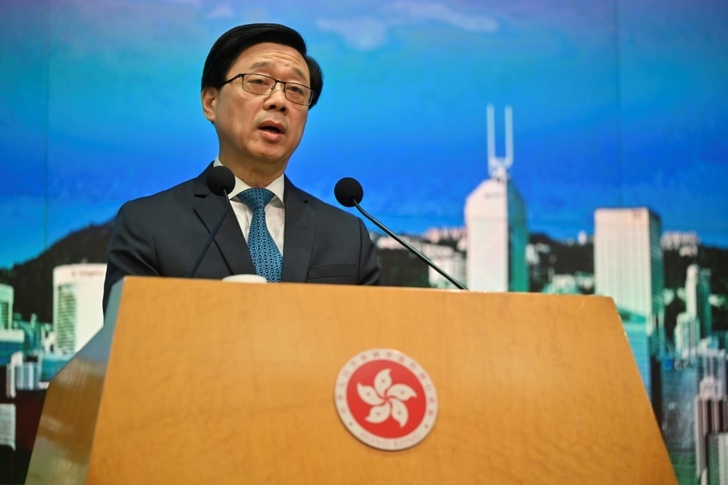Hong Kong's leader has called on eight overseas activists to turn themselves in a day after police put out bounties on them for violating the city's national security law.
Police on Monday offered rewards of HK$1 million ($128,000) each for information leading to the arrests of eight prominent democracy activists based abroad, accusing them of crimes such as subversion and colluding with foreign forces.
City leader John Lee said Tuesday that he supported the police action and called on the activists to surrender themselves.
"The only way to end their destiny of being an abscondee, who will be pursued for life, is to surrender," Lee told reporters, adding they would otherwise "spend their days in fear".
All eight fled Hong Kong after Beijing imposed a sweeping national security law on the financial hub in 2020 to quell dissent after huge, sometimes violent pro-democracy protests in 2019 were quashed.
Lee called on the public to assist police, adding that even the activists' "relatives and friends" could be informants.
The offer has been criticised by the United States, Britain and Australia -- countries where some of the wanted activists reside.
US State Department spokesperson Matthew Miller condemned the bounties as part of China's "transnational repression efforts" and called for them to be withdrawn.
"The extraterritorial application of the Beijing-imposed National Security Law is a dangerous precedent that threatens the human rights and fundamental freedoms of people all over the world," he added.
UK Foreign Secretary James Cleverly said Britain would "not tolerate any attempts by China to intimidate and silence individuals in the UK and overseas."
"The UK will always defend the universal right to freedom of expression and stand up for those who are targeted."
The Chinese embassy in London said in response that Britain had interfered with China's internal affairs by "openly (offering) protection for fugitives".
Hong Kong's decision to issue bounties was "not only constitutional and legal, but also in line with public opinion," the embassy spokesperson added.
Meanwhile, Australian Foreign Minister Penny Wong said her government was "deeply disappointed" by the bounties.
"We have consistently expressed concerns about the broad application of the National Security Law to arrest or pressure pro-democracy figures and civil society," Wong said Tuesday.
Asked about the criticism abroad, Hong Kong leader Lee replied that the city was not unique in having a national security law that was enforceable internationally.
"I'm not afraid of any political pressure that is put on us, because we do what we believe is right," Lee said Tuesday.
The eight wanted activists include former pro-democracy lawmakers Nathan Law, Ted Hui and Dennis Kwok.
Veteran unionist Mung Siu-tat is also among the wanted as are activists Elmer Yuen, Finn Lau, Anna Kwok and Kevin Yam.
hol/cwl
© Agence France-Presse
Your content is great. However, if any of the content contained herein violates any rights of yours, including those of copyright, please contact us immediately by e-mail at media[@]kissrpr.com.
Source: Story.KISSPR.com

